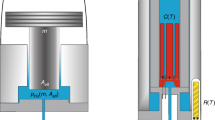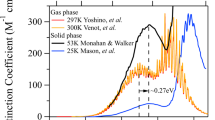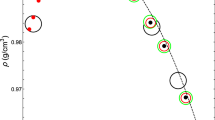Abstract
SOME years ago, results were published of measurements on the dielectric constant of carbon dioxide under pressures up to 1000 atm.1. Using Amagat's isotherm data, where available, the Clausius Mosotti function was calculated ; P is pro-portional to the polarizability of the molecule. It was stated that P showed a tendency to decrease, the decrease at 1000 atm. being about 1 per cent. It was considered not impossible at that time that this decrease was due to an uncertainty in the density d.
This is a preview of subscription content, access via your institution
Access options
Subscribe to this journal
Receive 51 print issues and online access
$199.00 per year
only $3.90 per issue
Buy this article
- Purchase on Springer Link
- Instant access to full article PDF
Prices may be subject to local taxes which are calculated during checkout
Similar content being viewed by others
References
Michels and Michels, Phil. Trans., A, 231, 587 (1933).
Michels and Michels, Proc. Roy. Soc., A, 153, 201 (1935).
C. G. Darwin, Proc. Roy. Soc., A, 146, 17 (1934).
W. Schottky, Phys. Z., 21, 232 (1920); J. C. Slater, J. Chem. Phys., 1, 691 (1933).
Author information
Authors and Affiliations
Rights and permissions
About this article
Cite this article
MICHELS, A., MICHELS-VERAART, C. & BIJL, A. Indication of a Decrease in the Polarizability of a Non-Polar Molecule by Pressure. Nature 138, 509–510 (1936). https://doi.org/10.1038/138509c0
Issue Date:
DOI: https://doi.org/10.1038/138509c0
Comments
By submitting a comment you agree to abide by our Terms and Community Guidelines. If you find something abusive or that does not comply with our terms or guidelines please flag it as inappropriate.



